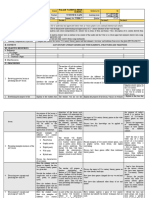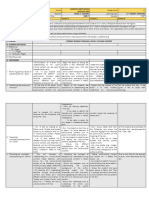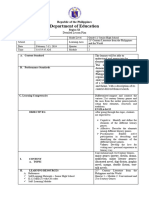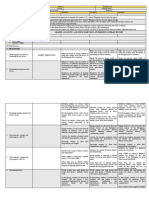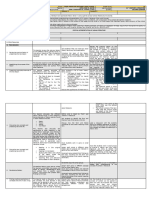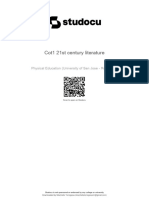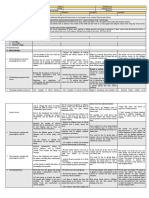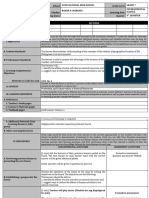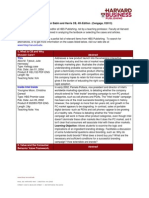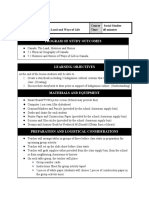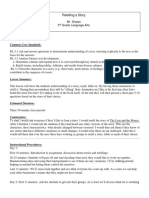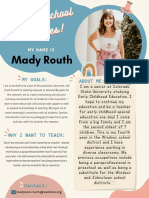0 ratings0% found this document useful (0 votes)
10 viewsEeeeeeuujgg
Eeeeeeuujgg
Uploaded by
noralyn.ligananThis document contains a daily lesson log for a class on 21st century literary genres. The objectives are to understand and appreciate literary texts from around the world in various 21st century genres, and to analyze texts in terms of form and theme with reference to their context. The lesson will compare and contrast elements, structures and traditions of 21st century genres globally. The content will cover these 21st century literary genres. Procedures include reviewing past lessons, introducing the topic, presenting examples of genres like flash fiction, graphic novels and digital poetry, and discussing their characteristics.
Copyright:
© All Rights Reserved
Available Formats
Download as DOCX, PDF, TXT or read online from Scribd
Eeeeeeuujgg
Eeeeeeuujgg
Uploaded by
noralyn.liganan0 ratings0% found this document useful (0 votes)
10 views4 pagesThis document contains a daily lesson log for a class on 21st century literary genres. The objectives are to understand and appreciate literary texts from around the world in various 21st century genres, and to analyze texts in terms of form and theme with reference to their context. The lesson will compare and contrast elements, structures and traditions of 21st century genres globally. The content will cover these 21st century literary genres. Procedures include reviewing past lessons, introducing the topic, presenting examples of genres like flash fiction, graphic novels and digital poetry, and discussing their characteristics.
Original Description:
hyfffdssskkkh
Original Title
eeeeeeuujgg
Copyright
© © All Rights Reserved
Available Formats
DOCX, PDF, TXT or read online from Scribd
Share this document
Did you find this document useful?
Is this content inappropriate?
This document contains a daily lesson log for a class on 21st century literary genres. The objectives are to understand and appreciate literary texts from around the world in various 21st century genres, and to analyze texts in terms of form and theme with reference to their context. The lesson will compare and contrast elements, structures and traditions of 21st century genres globally. The content will cover these 21st century literary genres. Procedures include reviewing past lessons, introducing the topic, presenting examples of genres like flash fiction, graphic novels and digital poetry, and discussing their characteristics.
Copyright:
© All Rights Reserved
Available Formats
Download as DOCX, PDF, TXT or read online from Scribd
Download as docx, pdf, or txt
0 ratings0% found this document useful (0 votes)
10 views4 pagesEeeeeeuujgg
Eeeeeeuujgg
Uploaded by
noralyn.ligananThis document contains a daily lesson log for a class on 21st century literary genres. The objectives are to understand and appreciate literary texts from around the world in various 21st century genres, and to analyze texts in terms of form and theme with reference to their context. The lesson will compare and contrast elements, structures and traditions of 21st century genres globally. The content will cover these 21st century literary genres. Procedures include reviewing past lessons, introducing the topic, presenting examples of genres like flash fiction, graphic novels and digital poetry, and discussing their characteristics.
Copyright:
© All Rights Reserved
Available Formats
Download as DOCX, PDF, TXT or read online from Scribd
Download as docx, pdf, or txt
You are on page 1of 4
School Grade Level
DAILY LESSON LOG Teacher Learning Area
Department of Education Teaching Dates and Time Quarter
Session 1: Session 2: Session 3: Session 4:
I. OBJECTIVES
A. Content Standards The learner will be able to understand and appreciate literary texts in various genres across national literature and cultures.
The learner will be able to demonstrate understanding and appreciation of 21 st century literature of the world through:
1. a written close analysis and critical interpretation of a literary text in terms of form and theme, with a description of its context derived from research;
B. Performance Standards 2. critical paper that analyzes literary texts in relation to the context of the reader and the writer or a critical paper that interprets literary texts using any of the critical
approaches; and
3. an adaptation of a text into other creative forms using multimedia.
C. Learning
Compare and contrast the various 21st century literary genres and their elements, structures, and traditions from across the globe (EN12Lit-IId-25).
Competencies/Objectives
II. CONTENT 21ST CENTURY LITERARY GENRES AND THEIR ELEMENTS, STRUCTURES AND TRADITIONS
III. LEARNING RESOURCES
A. References
1. TG’s Pages
2. LM’s Pages
3. Textbook’s Pages
B. Other Resources
IV. PROCEDURES
The teacher will ask the students about
- Begin the lesson by asking the class if
the different literary genres they have
they have read any 21st-century literature
learned in the previous lessons and write
from the Philippines and across the
Review the key concepts of 20th century them on the board. Then, the teacher will Review the different literary genres that
world.
literature. introduce what this lesson is about by were discussed in the previous lesson.
1. Reviewing previous lesson or - Ask them to give a brief summary of
presenting the following questions: What
presenting the new lesson what they remember from the previous
Introduce the concept of 21st century are the elements, structures, and Introduce the concept of 21st century
lesson about the different literary genres
literature. traditions involved in contemporary literary genres.
of the 21st-century.
literary genres of the 21st Century? How
- Give a brief outline of what will be
do they differ from the literary forms of
covered in today's lesson.
the past generations?
Explain to the students that the purpose The teacher will lay out the objectives of - Explain to the class that the purpose of
Explain the purpose of the lesson, which
of the lesson is to learn about the key 21st the lesson such that students will today's lesson is to analyze the impact of
is to evaluate the impact of 21st century
century literary genres. understand the difference between 21st-century literary genres on other
literary genres on the wider literary
2. Establishing the purpose of the traditional and post-modern literary cultures.
landscape.
lesson Discuss how this knowledge will be genres. Students will learn to identify the - Discuss the importance of
useful to the students in their elements, structures, and traditions of understanding the impact of these literary
Discuss how this knowledge can be
understanding and appreciation of 21st Century literary genres and how to works on different cultures.
applied to students' own lives.
literature. apply these concepts to their daily lives.
3. Presenting examples/instances of Present examples of different 21st The teacher will display pictures, Present examples of 21st century literary - Show the class a short video clip of a
the new lesson century literary genres, such as: samples, or excerpts of 21st Century genres, such as graphic novels, flash book review of a 21st-century literary
Flash fiction
literary genres such as poetry, prose,
Graphic novels genre from a different culture.
drama, and creative nonfiction. The fiction, and digital storytelling.
Digital poetry - Give out handouts with excerpts from
teacher will then walk them through the
Web series characteristics, themes, structures and Discuss how these genres differ from
various 21st-century literary genres from
Hybrid texts different cultures for the students to read
other elements present in each literary traditional literary genres.
and analyze.
genre.
Discuss the characteristics of each genre.
Have the students work in groups to
identify the key 21st century literary Discuss the impact of 21st century
genres in a given text. The teacher will prepare a handout literary genres on the wider literary - Lead a class discussion on the various
highlighting the features of 21st Century landscape. cultures that have been impacted by 21st-
Provide the students with a sample text, literary genres. Students will be divided century literary genres.
4. Discussing new concepts and
such as a short story, poem, or graphic into smaller groups and conduct a quick How have these genres changed the way - Discuss the possible reasons why some
practicing new skills #1
novel. analysis of each of the literary genres. we read and write? 21st-century literary genres have had a
They will take turns presenting their significant impact on certain cultures and
Have the students discuss the different findings to their classmates. How have they influenced other forms of less on others.
genres that are represented in the text and art and media?
explain their reasoning.
- Divide the class into small groups and
Have the students create their own assign each group a specific story or
examples of different 21st century As part of the class discussion, the excerpt from the handouts.
Have students analyze a piece of 21st
teacher will facilitate a debate or a open- - Ask each group to discuss among
literary genres. century literature and identify the literary
forum discussion on their findings. S/he themselves and identify how the 21st-
5. Discussing new concepts and techniques that are used.
will also discuss with them a brief history century literary genre impacts the culture
practicing new skills #2 Encourage the students to be creative and
of the literary context of the 21 st century it represents.
to experiment with different forms and Have students discuss the impact of these
and how literary genres transformed from - Encourage students to make
styles. techniques on the meaning of the text.
the traditional forms to post-modernism. connections between the text’s themes,
characters, setting, and the culture of the
author.
Have the students play a game in which To develop mastery, each group will be
- After group discussions, have students
they have to identify the 21st century given a task to create a 21st century
brainstorm ways in which they can use
literary genre of a given text. literary piece based on their preferred Have students create their own piece of
21st-century literary genres to create
genre and the assigned theme. (Themes 21st century literature.
cross-cultural dialogues and increase
6. Developing Mastery Create a set of flash cards with different can range from love, family,
understanding among different cultures.
texts on them. relationships, social issues, politics and Encourage them to use the literary
- Ask students to create a brief
identity) They will be given 10 minutes techniques that they have learned about.
presentation on this topic and present it
Have the students take turns flipping over to conceptualize the plot, character,
to the class.
a card and guessing the genre of the text. imagery, and tone of their works.
7. Finding practical applications of Discuss how the knowledge of 21st The teacher will ask students to relate the Discuss how the concepts and skills that - Discuss with students how the concept
concepts and skills in daily living century literary genres can be applied in literary elements they have learned to were learned in this lesson can be applied of understanding literary genres from
the students' everyday lives. their daily lives. The students will be to students' own lives. different cultures can impact their daily
divided into pairs and discuss how each lives.
For example, the students can use this literary genre draws cross-cultural How can they use these skills to be more - Ask students to think about how this
knowledge to: perceptions and lead to awareness of understanding can benefit them in the
creative and expressive?
Analyze the media they diverse experiences. workplace or in relationships with people
consume from different cultures.
Write their own creative works
Appreciate the work of other
authors
The teacher will summarize the lesson - Have a class discussion on how they
Have the students summarize the key discussing its significance, and ask can apply the concepts learned during
points of the lesson. students about the relevance of the Summarize the main points of the lesson. this lesson in their daily lives.
8. Generalizing and abstractions concepts to the present time. S/He will - Encourage students to make important
about the lesson Discuss how the concepts of 21st century then highlight the importance of reading What are the key takeaways from this connections and to develop an
literary genres relate to other concepts in contemporary literature to fully lesson? appreciation for literature produced from
literature. understand cross-cultural diversity and other cultures.
continuity.
- Evaluate student's understanding of the
Have the students complete a quiz or Have students take a quiz or complete a impact of 21st-century literary genres on
9. Evaluating Learning worksheet on the key concepts of the worksheet on the concepts that were other cultures.
lesson. learned in this lesson. - Use a rubric to measure and grade the
student's presentations.
Have the students read more examples of An extra activity will be given to students
21st century literary works. for unexpected absences or those who are
done early with the given tasks. They can
10. Additional Activities for
Have the students write their own opt to read short properties that will be
Application or Remediation
creative works in different 21st century displayed, with the students identifying
literary genres. which genre the piece belongs to and the
literary elements applied.
REFLECTION
A. No. of learners who earned 80%
in the evaluation.
B. No. of learners who require
additional activities for
remediation who scored below
80%.
C. Did the remedial lessons work?
No. of learners who have caught
up with the lesson.
D. No. of learners who continue to
require remediation.
E. Which of my teaching strategies
worked well? Why did this work?
F. What difficulties did I encounter
which my principal or supervisor
can help me solve?
G. What innovation or localized
materials did I use/discover which
I wish to share with other
teachers?
You might also like
- 21st Century Literature Quarter 2 Week 6Document5 pages21st Century Literature Quarter 2 Week 6Yvonne CafeNo ratings yet
- 21ST CENTURY LITERATURE 1 QUARTER 1 WEEK 3Document5 pages21ST CENTURY LITERATURE 1 QUARTER 1 WEEK 3April Mae JacobNo ratings yet
- 21ST Century Literature Q1 Week 7Document4 pages21ST Century Literature Q1 Week 7Naj CumlaNo ratings yet
- Week 3Document4 pagesWeek 3April Mae JacobNo ratings yet
- 21ST Century Literature Q1 Week 4Document4 pages21ST Century Literature Q1 Week 4Naj CumlaNo ratings yet
- Week 6Document2 pagesWeek 6geordelmarie.saclutiNo ratings yet
- DLL 21stCentLit Jan29 3 Feb01Document3 pagesDLL 21stCentLit Jan29 3 Feb01JulieSanchezErsando0% (1)
- 21ST CENTURY LITERATURE 1 QUARTER 1 WEEK 4Document4 pages21ST CENTURY LITERATURE 1 QUARTER 1 WEEK 4April Mae JacobNo ratings yet
- 21ST CENTURY LITERATURE 1 QUARTER 1 WEEK 2Document5 pages21ST CENTURY LITERATURE 1 QUARTER 1 WEEK 2April Mae JacobNo ratings yet
- 21ST Century Literature Quarter 2 Week 5Document4 pages21ST Century Literature Quarter 2 Week 5risalin venoyaNo ratings yet
- Co Grade 11 Genesis q1 21st Century Lit Sy 2023-2024 VHC - Final DLLDocument6 pagesCo Grade 11 Genesis q1 21st Century Lit Sy 2023-2024 VHC - Final DLLVanessa CabahugNo ratings yet
- 21ST CENTURY LITERATURE QUARTER 2 WEEK 3Document5 pages21ST CENTURY LITERATURE QUARTER 2 WEEK 3April Mae JacobNo ratings yet
- 21ST Century Literature Q1 Week 7Document6 pages21ST Century Literature Q1 Week 7liwanclarence24No ratings yet
- Ancheta 21ST Century Literature Quarter 1 Week 1Document5 pagesAncheta 21ST Century Literature Quarter 1 Week 1Jepoy Ancheta MusicNo ratings yet
- DLP-21st Wk2Document3 pagesDLP-21st Wk2jelica gallardoNo ratings yet
- 21ST Century Literature Quarter 2 Week 2Document4 pages21ST Century Literature Quarter 2 Week 2Jepoy Ancheta MusicNo ratings yet
- Week 4Document4 pagesWeek 4April Mae JacobNo ratings yet
- 21stC - DLL-02 (Aug. 29-Sept. 02)Document3 pages21stC - DLL-02 (Aug. 29-Sept. 02)Marites VardeleonNo ratings yet
- Reading and Writing Skills Teaching Dates & Time:: Based On Annex 2B.6 To Deped Order No. 42, S. 2016Document4 pagesReading and Writing Skills Teaching Dates & Time:: Based On Annex 2B.6 To Deped Order No. 42, S. 2016Milcah Roselle CandaNo ratings yet
- 21ST CENTURY LITERATURE QUARTER 2 WEEK 2Document4 pages21ST CENTURY LITERATURE QUARTER 2 WEEK 2April Mae JacobNo ratings yet
- HhhygggggggggDocument4 pagesHhhygggggggggnoralyn.ligananNo ratings yet
- 21ST CENTURY LITERATURE QUARTER 2 WEEK 8Document4 pages21ST CENTURY LITERATURE QUARTER 2 WEEK 8April Mae JacobNo ratings yet
- 3 DLP Literature Q3Document8 pages3 DLP Literature Q3Dorie Fe ManseNo ratings yet
- 2ND Q Week 2Document3 pages2ND Q Week 2Ava Marie Cuay PalahangNo ratings yet
- q2 Week 1 DLLDocument2 pagesq2 Week 1 DLLJasmin Goot Rayos100% (3)
- DLL asianDocument3 pagesDLL asianlizamizchelle.bausaNo ratings yet
- 4 DLP Literature Lesson 3Document5 pages4 DLP Literature Lesson 3Dorie Fe ManseNo ratings yet
- 21stC - DLL-03 (Sept. 05-09)Document3 pages21stC - DLL-03 (Sept. 05-09)Marites VardeleonNo ratings yet
- 21ST CENTURY LITERATURE 1 QUARTER 1 WEEK 2 pdfDocument5 pages21ST CENTURY LITERATURE 1 QUARTER 1 WEEK 2 pdfcoleenmae.saluibNo ratings yet
- 21ST Century Literature Q1 Week 1Document5 pages21ST Century Literature Q1 Week 1liwanclarence24No ratings yet
- TG of Common ThemesDocument5 pagesTG of Common ThemesJhemuel BasasNo ratings yet
- Cpar Q1 Week3Document4 pagesCpar Q1 Week3rachelNo ratings yet
- JjjuggggDocument4 pagesJjjuggggnoralyn.ligananNo ratings yet
- 21st Week3Document3 pages21st Week3Hannae pascuaNo ratings yet
- 21ST CENTURY LITERATURE 1 QUARTER 1 WEEK 7Document5 pages21ST CENTURY LITERATURE 1 QUARTER 1 WEEK 7coleenmae.saluibNo ratings yet
- Week 1Document4 pagesWeek 1April Mae JacobNo ratings yet
- 21CLPW Complete ModulesDocument145 pages21CLPW Complete ModulesJC Appartelle100% (1)
- 21ST CENTURY LITERATURE 1 QUARTER 1 WEEK 1Document5 pages21ST CENTURY LITERATURE 1 QUARTER 1 WEEK 1April Mae JacobNo ratings yet
- DLP. 21ST CENTURY LIT - Week-3 LITERARY GENRESDocument4 pagesDLP. 21ST CENTURY LIT - Week-3 LITERARY GENRESMichelle ManzanoNo ratings yet
- 21ST CENTURY LITERATURE QUARTER 2 WEEK 1Document3 pages21ST CENTURY LITERATURE QUARTER 2 WEEK 1April Mae JacobNo ratings yet
- 21ST Century Literature Q2 Week 1Document6 pages21ST Century Literature Q2 Week 1liwanclarence24No ratings yet
- Lesson Plan For 21STDocument4 pagesLesson Plan For 21STEdgardo Nino MaroNo ratings yet
- 21st Century Lit Curriculum MapDocument3 pages21st Century Lit Curriculum MapJennette TrinityNo ratings yet
- 21st DLLDocument2 pages21st DLLzettevasquez8No ratings yet
- DLL Week 2Document2 pagesDLL Week 2SHAINA DOBLENo ratings yet
- 21st DLPDocument5 pages21st DLProwena sitchonNo ratings yet
- MARCH DLLDocument4 pagesMARCH DLLCha MaganayeNo ratings yet
- Eng 4Document3 pagesEng 4Cha MaganayeNo ratings yet
- 21 Century Literature From The Philippines and The WorldDocument18 pages21 Century Literature From The Philippines and The WorldmarleneNo ratings yet
- 21ST Century Literature DLLDocument6 pages21ST Century Literature DLLGeraldine SitoyNo ratings yet
- Lesson Plan in 21st Century Literature PDocument15 pagesLesson Plan in 21st Century Literature PEdgardo Nino MaroNo ratings yet
- Week 1 21ST - 014324Document3 pagesWeek 1 21ST - 014324Jennifer AlbaradoNo ratings yet
- WEEK 1_1ST QUARTER_EAPPDocument3 pagesWEEK 1_1ST QUARTER_EAPProchelle.dionisio001No ratings yet
- 21st Century Lit DLL Compilation For Printing ObservationDocument91 pages21st Century Lit DLL Compilation For Printing ObservationRobert Carl GarciaNo ratings yet
- Cot1 21st Century LiteratureDocument13 pagesCot1 21st Century LiteratureMischelle C. TorregosaNo ratings yet
- Week 1Document2 pagesWeek 1geordelmarie.saclutiNo ratings yet
- DLL @ND Week 1 JANDocument10 pagesDLL @ND Week 1 JANPrincess Canceran BulanNo ratings yet
- UuhygggDocument4 pagesUuhygggnoralyn.ligananNo ratings yet
- Self Portraits Through the Ages of Art History: Through the Ages of Art HistoryFrom EverandSelf Portraits Through the Ages of Art History: Through the Ages of Art HistoryNo ratings yet
- The Teacher and Student in Literature: A Literature Study and Creative Writing Course to Take or to Teach as a Distance-Learning Student or as a Real but Remote InstructorFrom EverandThe Teacher and Student in Literature: A Literature Study and Creative Writing Course to Take or to Teach as a Distance-Learning Student or as a Real but Remote InstructorNo ratings yet
- HNNNJJJJJFFRFFDocument5 pagesHNNNJJJJJFFRFFnoralyn.ligananNo ratings yet
- KijikkiiiiDocument3 pagesKijikkiiiinoralyn.ligananNo ratings yet
- VvcfxxdssDocument4 pagesVvcfxxdssnoralyn.ligananNo ratings yet
- UuhygggDocument4 pagesUuhygggnoralyn.ligananNo ratings yet
- SwaaaaaaddDocument4 pagesSwaaaaaaddnoralyn.ligananNo ratings yet
- BBNGVVVVDSDSDDocument4 pagesBBNGVVVVDSDSDnoralyn.ligananNo ratings yet
- BgfddederDocument4 pagesBgfddedernoralyn.ligananNo ratings yet
- JjjuggggDocument4 pagesJjjuggggnoralyn.ligananNo ratings yet
- RICS Assessment of Professional Competence (APC) Submission Template - 2018 PathwaysDocument13 pagesRICS Assessment of Professional Competence (APC) Submission Template - 2018 PathwaysRICS100% (1)
- CO 4th ConservationDocument7 pagesCO 4th ConservationrhaiceenNo ratings yet
- ESP Methodology. Course GuideDocument23 pagesESP Methodology. Course GuideNguyễn Vân QuỳnhhNo ratings yet
- Karthick CVDocument2 pagesKarthick CVamirtharajmsc_2006No ratings yet
- Chapter 2 FINALDocument9 pagesChapter 2 FINALjose randyNo ratings yet
- Case Map For Babin and Harris CB, 4th Edition (Cengage, ©2013)Document14 pagesCase Map For Babin and Harris CB, 4th Edition (Cengage, ©2013)meherey2kNo ratings yet
- Ej 1063949Document8 pagesEj 1063949api-520294983No ratings yet
- Lesson Plan-2Document4 pagesLesson Plan-2Nguyễn HươngNo ratings yet
- NSED 1st Quarter Narrative and DocumentationDocument3 pagesNSED 1st Quarter Narrative and DocumentationRames Ely GJNo ratings yet
- 300585-San Antonio National High School: Schools Division of IsabelaDocument3 pages300585-San Antonio National High School: Schools Division of Isabelamary jean magdayNo ratings yet
- Department of Education: Republic of The PhilippinesDocument3 pagesDepartment of Education: Republic of The PhilippinesEstrella M. BellenNo ratings yet
- Compilationofcgfortle 2014Document539 pagesCompilationofcgfortle 2014Jardo de la PeñaNo ratings yet
- Approaches To Language TestingDocument7 pagesApproaches To Language TestingSella PlkNo ratings yet
- The Importance of Core Life Skills in Students LifeDocument4 pagesThe Importance of Core Life Skills in Students LifeHamd O SanaNo ratings yet
- Dokumen - Pub Teaching Reading Strategies and Resources For Grades K 6 1nbsped 9781606234846 9781606234839Document353 pagesDokumen - Pub Teaching Reading Strategies and Resources For Grades K 6 1nbsped 9781606234846 9781606234839Tuyet NguyenNo ratings yet
- IFFA6312 - Activity 3 Touch PointDocument12 pagesIFFA6312 - Activity 3 Touch Pointzmagadla0808No ratings yet
- UNICEF Lego Foundation Learning Through PlayDocument39 pagesUNICEF Lego Foundation Learning Through PlayEndalkachew AbateNo ratings yet
- Indigenous Lesson Plan Xixi and KoriDocument7 pagesIndigenous Lesson Plan Xixi and Koriapi-638166426No ratings yet
- Questionnaire (Exam)Document7 pagesQuestionnaire (Exam)Riza CabellezaNo ratings yet
- HRM Dessler 08 Training and DevelopmentDocument52 pagesHRM Dessler 08 Training and DevelopmentQila Qils Ecky100% (6)
- 9 - (M9AL-IIa-1) Direct VariationDocument4 pages9 - (M9AL-IIa-1) Direct VariationMariel Pastolero100% (1)
- Chapter 5, Class 9 - AIDocument4 pagesChapter 5, Class 9 - AIAbhishek Singh BaghelNo ratings yet
- Seagull-G3-Humss Chapter 1-5Document28 pagesSeagull-G3-Humss Chapter 1-5Eiszel CadacioNo ratings yet
- Phases of Strategic ManagementDocument3 pagesPhases of Strategic ManagementIm Kitty StephanieNo ratings yet
- Retelling A StoryDocument4 pagesRetelling A StoryShawn McFarlandNo ratings yet
- Introduction Prek FamiliesDocument1 pageIntroduction Prek Familiesapi-526976938No ratings yet
- MEMO Grade 10 LO Exam Term 4 2018 FinaDocument9 pagesMEMO Grade 10 LO Exam Term 4 2018 FinaThabisa BoutlwanyeNo ratings yet
- Cot 2021 Ap6Document9 pagesCot 2021 Ap6Alyssa Lae Cabildo Feliciano - TolentinoNo ratings yet
- Anny Pham: EducationDocument1 pageAnny Pham: Educationapi-250025057No ratings yet
- Example Beginning Band AssessmentDocument2 pagesExample Beginning Band Assessmentapi-643288266No ratings yet
